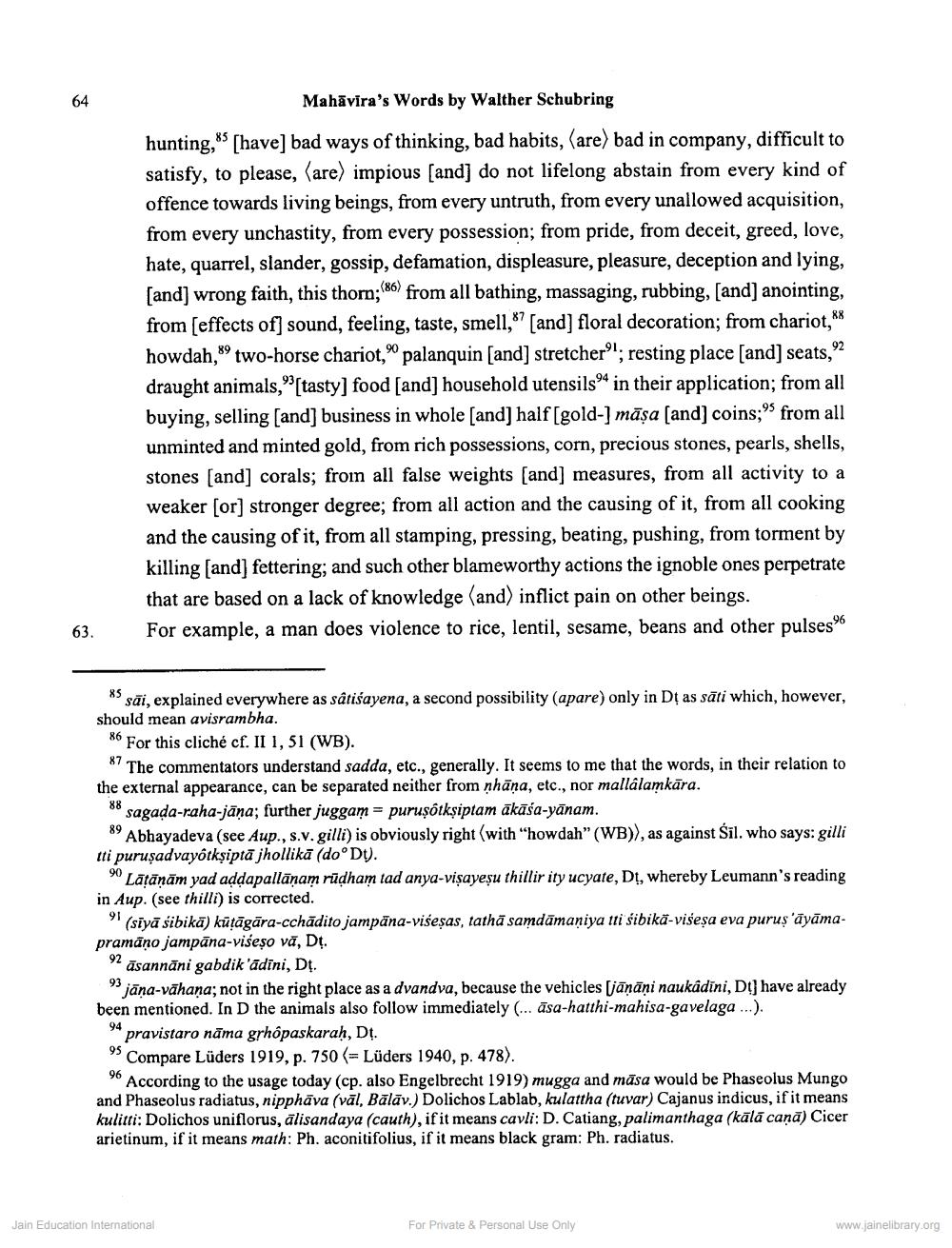________________
Mahāvira's Words by Walther Schubring hunting,85 [have] bad ways of thinking, bad habits, (are) bad in company, difficult to satisfy, to please, (are) impious [and] do not lifelong abstain from every kind of offence towards living beings, from every untruth, from every unallowed acquisition, from every unchastity, from every possession; from pride, from deceit, greed, love, hate, quarrel, slander, gossip, defamation, displeasure, pleasure, deception and lying, [and] wrong faith, this thorn;(86) from all bathing, massaging, rubbing, (and) anointing, from (effects of] sound, feeling, taste, smell, ? [and] floral decoration; from chariot,88 howdah, two-horse chariot, palanquin [and] stretcher"; resting place [and] seats,92 draught animals,"[tasty) food [and] household utensils94 in their application; from all buying, selling (and) business in whole [and] half [gold-] māsa (and) coins;%from all unminted and minted gold, from rich possessions, corn, precious stones, pearls, shells, stones [and] corals; froin all false weights (and) measures, from all activity to a weaker [or] stronger degree; from all action and the causing of it, from all cooking and the causing of it, from all stamping, pressing, beating, pushing, from torment by killing [and] fettering; and such other blameworthy actions the ignoble ones perpetrate that are based on a lack of knowledge (and) inflict pain on other beings. For example, a man does violence to rice, lentil, sesame, beans and other pulses
*s sãi, explained everywhere as sâtiśayena, a second possibility (apare) only in Dț as sāti which, however, should mean avisrambha. * For this cliché cf. II 1,51 (WB).
* The commentators understand sadda, etc., generally. It seems to me that the words, in their relation to the external appearance, can be separated neither from nhāna, etc., nor mallâlamkāra.
* sagada-raha-jāņa; further juggam = puruşôtkşiptam ākāśa-yānam. 89 Abhayadeva (see Aup., s.v. gilli) is obviously right (with "howdah" (WB)), as against Śil. who says: gilli tti puruṣadvayótkşiptā jhollikā (dooDt).
Lātānām yad addapallānam rūdham tad anya-vişayeșu thillir ity ucyate, Dļ, whereby Leumann's reading in Aup. (see thilli) is corrected.
(sīyā sibikā) kūtāgāra-cchădito jampāna-viseșas, tathā samdāmaniya ni sibika-viseşa eva purus 'āyāmapramāno jampāna-višeşo vā, Dt. » asannāni gabdik'ādini, Dț.
"jāna-vāhana; not in the right place as a dvandva, because the vehicles (jāņāņi naukadini, DJ have already been mentioned. In D the animals also follow immediately ... āsa-hatthi-mahisa-gavelaga ...). 94 pravistaro nāma grhópaskarah, Dt. 9 Compare Lüders 1919, p. 750 (= Lüders 1940, p. 478).
* According to the usage today (cp. also Engelbrecht 1919) mugga and māsa would be Phaseolus Mungo and Phaseolus radiatus, nipphāva (vāl, Bālāv.) Dolichos Lablab, kulattha (tuvar) Cajanus indicus, if it means kulitti: Dolichos uniflorus, alisandaya (cauth), if it means cavli: D. Catiang, palimanthaga (kālā cana) Cicer arietinum, if it means math: Ph. aconitifolius, if it means black gram: Ph. radiatus.
Jain Education International
For Private & Personal Use Only
www.jainelibrary.org




